Alberus, Erasmus - Ein Engel Schön aus Gottes Thron
 for solo voice / unison choir a cappella
for solo voice / unison choir a cappella
year of composition / 1st publication: N/A - This publication: 1697
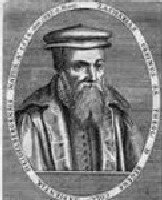 |
Composer:
Erasmus Alberus (c1500-1553)
aliases, aka: né Alber Country of origin / activity: Germany |
|
| Text author: unknown | ||
| Arranger / Editor: N/A |
Available documentation:
Score: Strassburg Gesangbuch (1697) http://www.lutheranlegacy.org/viewbook.asp?BookID=12 mensural notation
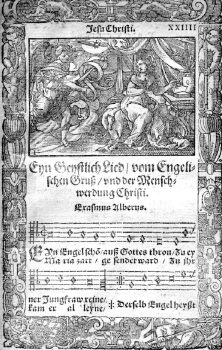 |
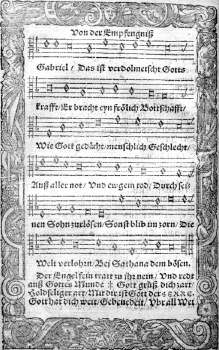 |
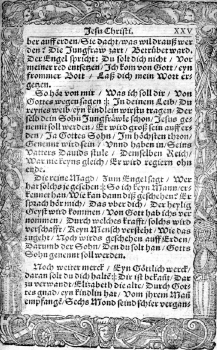 |
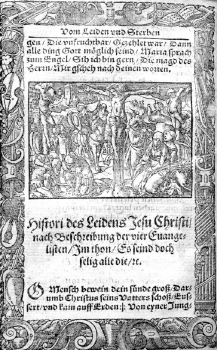 |
| The MIDI on this page was transcribed from this original score. | |||
MIDI: |
MP3: not available |
| Play / stop MIDI |
Lyrics: (source: http://www.hymnary.org/text/ein_engel_schon_aus_gottes_thron)
Recording:
| not available |
Video - posted on YouTube:
| not available at this time | YOU could be featured here! If you or your choir perform this Ave Maria, make a video recording. Post your video on YouTube, email me the page URL and I'll embed the video in this page. |
Internet references, biography information:
| http://en.wikipedia.org/wiki/Erasmus_Alberus |
| Erasmus Alberus (c. 1500–1553), German humanist, reformer, and poet, was born in the village of Bruchenbrücken (now part of Friedberg, Hesse) about the year 1500. Although his father Tilemann Alber was a schoolmaster, his early education was neglected. Ultimately in 1518 he found his way to the University of Wittenberg, where he studied theology. He had the good fortune to attract the attention of Martin Luther and Philipp Melanchthon, and subsequently became one of Luther's most active helpers in the Protestant Reformation. Not only did he fight for the Protestant cause as a preacher and theologian, but he was almost the only member of Luther's party who was able to confront the Roman Catholics with the weapon of literary satire. In 1542 he published a prose satire to which Luther wrote the preface, Der Barfusser Monche Eulenspiegel und Alkoran, a parodic adaptation of the Liber conformitatum of the Franciscan Bartolommeo Rinonico of Pisa, in which the Franciscan order is held up to ridicule. Of higher literary value is the didactic and satirical Buch von der Tugend und Weisheit (1550), a collection
of forty-nine fables in which Alberus embodies his views on the relations of Church and State. His satire is incisive, but in a scholarly and humanistic way; it does not appeal to popular passions with the fierce directness which enabled the master of Catholic satire, Thomas Murner, to inflict such telling blows. Several of Alberus's hymns, all of which show the influence of his master Luther, have been retained in the German Protestant hymnal. After Luther's death, Alberus was for a time a deacon in Wittenberg; he became involved, however, in the political conflicts of the time, and was in Magdeburg in 1550-1551, while that town was besieged by Maurice, Elector of Saxony. In 1552 he was appointed Generalsuperintendent at Neubrandenburg in Mecklenburg,[1] where he died on the 5 May 1553. |
| http://www.sheetmusicplus.com/title/Ein-Engel-schon-aus-Gottes-Thron/17876003 |
| The same title in SATB, composer Michael Praetorius (1571-1621). Published by Doblinger Music Publishers (DB.S-00099). It is unknown if this is based on the same tune. |
| Dictionary of Hymnology (1907) John D. Julian (1839-1913) |
| Alber, Erasmus, son of Tileman Alber, afterwards pastor at Engelroth, was born at Sprendlingen c. 1500. After studying at Wittenberg under Luther and Melanchthon, he became, in 1525, schoolmaster at St. Ursel, near Frankfurt-am-Main, and in 1527 at Heldenbergen, in Hesse Darmstadt. In 1528 he was appointed by the Landgrave Philip of Hesse pastor at Sprendlingen and Götzenhain, where he devoted himself specially to the children of his charge. After 11 years' service he was appointed by the Elector Joachim of Brandenburg court preacher at Berlin, but proving too faithful for the court, was, in 1541, removed as chief pastor to Neu Brandenburg. In 1542 he became pastor at Stade, in Wetteravia, and while there received, in 1513, the degree of Doctor of Theology from the University of Wittenberg. He was then invited, in the beginning of 1545, by the Landgrave Philip IV. of Hanau Lichtenberg, to perfect the work of the Reformation in Babenhausen, but no sooner had he fairly entered upon it than, in the end of October, he received his dismissal. After a short stay at Sprendlingen and at Wittenberg, he became preacher at Magdeburg, where he strongly denounced the Interim (see Agricola). On the capitulation of Magdeburg, in 1551, after a 14 months' siege, he fled to Hamburg, and then went to Lübeck. Finally, in 1552, he was appointed by Duke Albrecht I. of Mecklenburg, General Superintendent of Mecklenburg, and preacher at St. Mary's Church in Neu Brandenburg. In addition to losing all his own and his wife's property by confiscation and necessary expenditure, he was there unable to obtain from the Town Council the payment of his stipend. On May 4, 1553, he applied for the payment of 60 florins to relieve his urgent necessities. The refusal broke his heart. He returned home to die, and fell asleep at 9 a.m. on May 5, 1553. One of the best writers for children in his day, and an ardent controversialist and martyr of freedom of speech, he has been by some ranked, as a hymn-writer, next to Luther, in the Reformation period. His hymns, 20 in all, were first collected by Dr. Stromberger, and published at Halle, 1857. Being mostly long, and ungainly in style, not many of them have kept a place in the hymn-books, though they have been justly styled "powerful and living witnesses of a steadfast faith and a manly trust in God's Word" (Koch, i. 301-306; Allgemeine Deutsche Biographie i. 219-20; Dr. Stromberger's Preface; Bode, pp. 35-36—the last stating that his father was a school¬master at Sprendlingen.) Two have been translated into English. One of these, beginning "Christe, du bist der hello Tag," is a translation, and is noted under, "Christe qui lux es et dies." The only original hymn by Alber translated into English is:— Nun freut euch Gottes Kinder all. [Ascension.] First published on a broadsheet, N.P. N.D., 1549, and thence in Wackernagel, iii. p. 881, in 29 stanzas of 4 lines. In a broadsheet at Nürnberg, c. 1555, it is entitled, "Of the Fruits of the Ascension of our Lord Christ and of the Gifts of the Holy Spirit," and begins—"Freut euch ihr Gottes Kinder all." This form is included in Dr. Stromberger's edition of Alber's Geistliche Lieder, 1857, p. 5. In the hymn-books it is generally abridged, and so the Berlin Geistliche Lieder, ed. 1863, 339, gives 16 stanzas (i.-vi., ix.-xi., xiii., xviii., xxv.-xxix., of the first form). A translation:— 0 Children of your God rejoice, of stanzas i., ii., iv., xxvii.-xxix., by A. T. Russell, is given as No. 122, in his Psalms & Hymns 1851. [Rev. James Mearns, M.A.] |
Page last modified: August 17, 2013
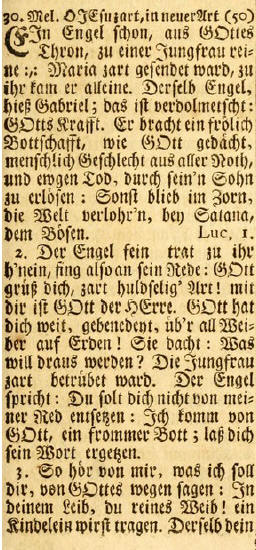
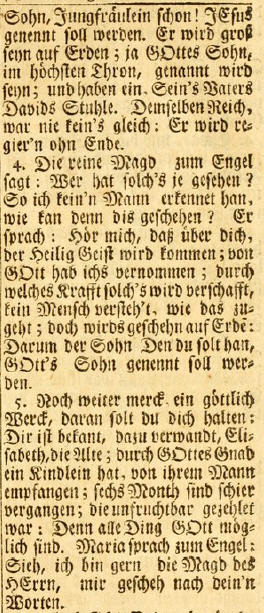
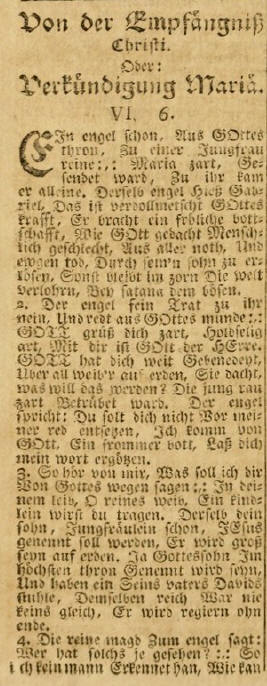
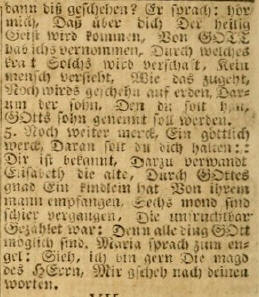
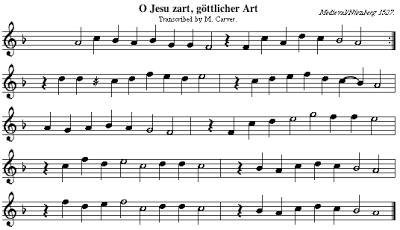

 avemariasongs
avemariasongs org
org